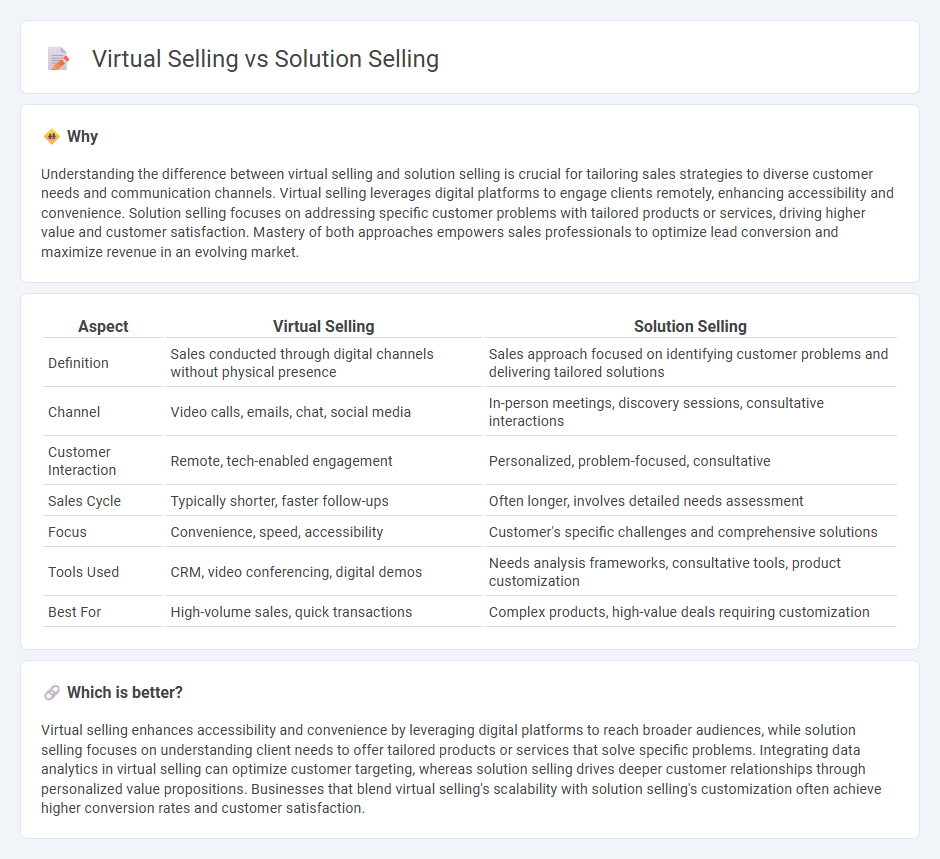
Virtual selling leverages digital platforms and tools to engage customers remotely, enhancing reach and convenience in the sales process. Solution selling focuses on identifying customer needs and providing tailored products or services that address specific challenges, fostering deeper relationships and long-term value. Explore more to understand how combining these strategies can optimize your sales performance.
Why it is important
Understanding the difference between virtual selling and solution selling is crucial for tailoring sales strategies to diverse customer needs and communication channels. Virtual selling leverages digital platforms to engage clients remotely, enhancing accessibility and convenience. Solution selling focuses on addressing specific customer problems with tailored products or services, driving higher value and customer satisfaction. Mastery of both approaches empowers sales professionals to optimize lead conversion and maximize revenue in an evolving market.
Comparison Table
| Aspect | Virtual Selling | Solution Selling |
|---|---|---|
| Definition | Sales conducted through digital channels without physical presence | Sales approach focused on identifying customer problems and delivering tailored solutions |
| Channel | Video calls, emails, chat, social media | In-person meetings, discovery sessions, consultative interactions |
| Customer Interaction | Remote, tech-enabled engagement | Personalized, problem-focused, consultative |
| Sales Cycle | Typically shorter, faster follow-ups | Often longer, involves detailed needs assessment |
| Focus | Convenience, speed, accessibility | Customer's specific challenges and comprehensive solutions |
| Tools Used | CRM, video conferencing, digital demos | Needs analysis frameworks, consultative tools, product customization |
| Best For | High-volume sales, quick transactions | Complex products, high-value deals requiring customization |
Which is better?
Virtual selling enhances accessibility and convenience by leveraging digital platforms to reach broader audiences, while solution selling focuses on understanding client needs to offer tailored products or services that solve specific problems. Integrating data analytics in virtual selling can optimize customer targeting, whereas solution selling drives deeper customer relationships through personalized value propositions. Businesses that blend virtual selling's scalability with solution selling's customization often achieve higher conversion rates and customer satisfaction.
Connection
Virtual selling leverages digital platforms to engage customers remotely, enabling real-time communication and personalized experiences that align with solution selling principles. Solution selling focuses on identifying customer pain points and offering tailored products or services that address specific needs, which virtual selling facilitates through interactive tools and data-driven insights. Integrating virtual selling with solution selling enhances sales effectiveness by delivering customized solutions efficiently in a digitally connected environment.
Key Terms
**Solution Selling:**
Solution selling centers on identifying and addressing customer pain points by offering tailored products or services that deliver measurable business value. It relies on in-depth needs analysis, consultative communication, and customized solutions to drive client success and long-term relationships. Explore more to understand how solution selling can transform your sales strategy.
Needs Assessment
Solution selling emphasizes a comprehensive needs assessment by identifying specific customer pain points and tailoring products or services to solve those problems effectively. Virtual selling requires adapting needs assessment techniques through digital tools like video calls, interactive presentations, and CRM analytics to engage clients remotely. Discover how leveraging precise needs assessment in both methods can boost sales performance and customer satisfaction.
Value Proposition
Solution selling emphasizes tailoring the value proposition to address the customer's specific pain points and business outcomes, ensuring the product or service directly resolves key challenges. Virtual selling leverages digital tools to effectively communicate and demonstrate this value proposition remotely, maintaining engagement and personalization despite physical distance. Explore in-depth strategies to optimize your value proposition for both solution selling and virtual selling environments.
Source and External Links
Value Selling vs. Solution Selling - This article discusses the differences between value selling and solution selling, highlighting how solution selling focuses on solving specific customer pain points.
Solution Selling vs. Consultative Selling - This piece contrasts solution selling, which offers tailored solutions to specific customer challenges, with consultative selling, which emphasizes understanding client needs.
Solution Selling: What It Is & How to Do It Effectively - This article outlines a step-by-step approach to implementing solution selling effectively, focusing on understanding customer needs and proposing solutions.
 dowidth.com
dowidth.com